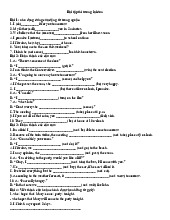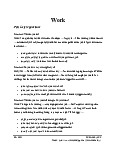



Preview text:
Name: Group: IN-CLASS PRACTICE 2 Matching headings Passage 1
In the text, paragraphs are labelled A-H. Match the correct heading to the paragraph. List of headings: i.
Failing relationships and negative feelings ii.
Winning the lottery may not make you happier iii. What is Hedonic Adaptation? iv.
Philanthropy benefits the giver v. Wealth management issues vi. Spend your winnings wisely vii. What you do, not what you buy viii. Behavioral Changes
WOULD WINNING THE LOTTERY MAKE YOU HAPPIER?
Imagine spending your last bit of cash on a lottery ticket as a whimsical solution to your penniless
state and then finding out one morning that you had won, what would you feel? First off, you were
truly lucky with odds of 1 in 13,983,816, you’ve got a higher chance of dying from animal attacks
or diseases than winning the lottery.
Like any rational being would, a surge of happiness would instantly fill your body; you can finally
afford your mortgage or even get a larger house, buy a nice car, get the latest gadgets, and
everything you have ever wanted in life. However, would having large sums of money in your
bank account elevate your level of happiness for the rest of your life?
A study in 1978 by three researchers from the University of Massachusetts and Northwestern
University wanted answers. So, they asked recent Illinois State lottery winners about their levels of
happiness and comparing them to paraplegic and quadriplegic survivors of catastrophic accidents.
Each group was asked to rate how much pleasure they derive from normal everyday activities such
as chatting with a friend, hearing a joke or receiving a compliment. After analysing their results,
they found out that the victim group felt happier in their everyday life compared to those who won the lottery.
A. This is partially due to a phenomenon called hedonic adaptation or the hedonic treadmill. This
describes our tendency to become used to the happiness after experiencing it for the first time. For
example, landing the job that you have always wanted may give you happiness but the thrill wears
off after a certain period of time. Though it may sound a little bit counterintuitive, hedonic
adaptation helps us maintain a steady and emotional equilibrium which makes us less sensitive to
any changes including negative events. This phenomenon allows us to revert back to our default
emotional state after experiencing high levels of emotion whether good or bad.
B. Piecing together this information, winning the lottery would make you happy but only for a
short period of time. After getting used to the luxuries of having enough funds for grandiose
homes, better food, and nicer clothes, we go back to how we used to feel before we won the prize.
Therefore, winning the lottery doesn’t guarantee happiness, in fact, lottery winners even reported
being unhappy after they have won the prize.
C. One of the reasons why this is so is because large sums of money can be a lot to manage. Take
for example the case of Lisa Arcand from Massachusetts. She won $1 million in 2004 and like all
winners, she went on lavish vacations and bought a nice house. However, a million dollars isn’t
much for taxes; she even opened a restaurant to keep the cash flowing but to no avail, losing
everything in 2007. Another example is Michael Caroll who turned from lottery winner to factory
worker, even after winning £9.7 million in 2002. Janite Lee, Willie Hurt, and Lou Eisenberg, are
just some of the many names that have won the lottery but went from rags to riches and back to
rags because of poor financial decisions.
D. Aside from difficulty in managing finances, winning the lottery can be an isolating experience.
Unwanted attention and unwanted requests for money from peers can make us paranoid and
anxious. Eventually, lottery winners wind up cutting themselves from others because of the fear of
being used as a just a source of money than a source of friendship.
E. While the constant fear of losing everything can haunt lottery winners, some even become
greedier than they were before winning. A study conducted by social-psychologist Paul Piff at the
UC Berkeley Campus in California, proves that gaining wealth can actually change our behaviour
drastically. Using a rigged game of Monopoly, Piff chose a player at random to play the game at a
certain advantage such as more starting money, and better ability to move around the board. In just
after 15 minutes, the advantaged players displayed dramatic change in behaviour including
forceful movement of boardgame pieces, speaking louder, and even minute things such as eating
more snacks compared to other players.
F. Having a lot of money can open new opportunities for us to enjoy life more than just having
expensive things. With hedonic adaptation embedded in our systems, finding what really
guarantees happiness can be a hurdle on the way. However, findings show that people tend to
adapt faster to extrinsic and material things than we do on experience. Travelling, exploring, and
even learning a new skill, gives us more gratification than having the latest clothes from your
favourite designer or luxury brand. Therefore, investing in experiences makes us happier than investing in things.
G. Another thing that would help you convert your money into happiness is through charity.
Believe it or not, giving others provides more happiness than spending it on yourself. A study by
the University of British Columbia and Harvard Business School proved that spending more on
others provides more happiness than spending it on yourself. Participants were asked to spend
money however they wish, be it on themselves or unto others. Afterwards, a survey was conducted
to rate their level of happiness. The group who donated their money to charity feel happier than
those who spent it on themselves.
While having money does make us happy today, it doesn’t guarantee our happiness in the long-
run. Thanks to hedonic adaptation, we get used to the emotions that we feel but we can get around
it by making every penny count – not on materialistic things – but on experiences and by giving back to the community. Passage 2
In the text, paragraphs are labelled A-F. Match the correct heading to the paragraph. List of headings:
i Some of the things liars really do
ii When do we begin to lie?
iii How wrong is it to lie?
iv Exposing some false beliefs
v Which form of communication best exposes a lie? vi Do only humans lie?
vii Dealing with known liars
viii A public test of our ability to spot a lie THE TRUTH ABOUT LYING
Over the years Richard Wiseman has tried to unravel the truth about deception - investigating the signs that give away a liar. A
In the 1970s, as part of a large-scale research programme exploring the area of Interspecies
communication, Dr Francine Patterson from Stanford University attempted to teach two lowland
gorillas called Michael and Koko a simplified version of Sign Language. According to Patterson,
the great apes were capable of holding meaningful conversations, and could even reflect upon
profound topics, such as love and death. During the project, their trainers believe they uncovered
instances where the two gorillas' linguistic skills seemed to provide reliable evidence of intentional
deceit. In one example, Koko broke a toy cat, and then signed to indicate that the breakage had
been caused by one of her trainers.
In another episode, Michael ripped a jacket belonging to a trainer and, when asked who was
responsible for the incident, signed ‘Koko’. When the trainer expressed some scepticism, Michael
appeared to change his mind, and indicated that Dr Patterson was actually responsible, before finally confessing. B
Other researchers have explored the development of deception in children. Some of the most
interesting experiments have involved asking youngsters not to take a peek at their favourite toys.
During these studies, a child is led into a laboratory and asked to face one of the walls. The
experimenter then explains that he is going to set up an elaborate toy a few feet behind them. After
setting up the toy, the experimenter says that he has to leave the laboratory, and asks the child not
to turn around and peek at the toy. The child is secretly filmed by hidden cameras for a few
minutes, and then the experimenter returns and asks them whether they peeked. Almost all three-
year-olds do, and then half of them lie about it to the experimenter. By the time the children have
reached the age of five, all of them peek and all of them lie. The results provide compelling
evidence that lying starts to emerge the moment we learn to speak. C
So what are the tell-tale signs that give away a lie? In 1994, the psychologist Richard Wiseman
devised a large-scale experiment on a TV programme called Tomorrow's World. As part of the
experiment, viewers watched two interviews in which Wiseman asked a presenter in front of the
cameras to describe his favourite film. In one interview, the presenter picked Some Like It Hot and
he told the truth; in the other interview, he picked Gone with the Wind and lied. The viewers were
then invited to make a choice - to telephone in to say which film he was lying about. More than
30,000 calls were received, but viewers were unable to tell the difference and the vote was a 50/50
split. In similar experiments, the results have been remarkably consistent - when it comes to lie
detection, people might as well simply toss a coin. It doesn’t matter if you are male or female,
young or old; very few people are able to detect deception. D
Why is this? Professor Charles Bond from the Texas Christian University has conducted surveys
into the sorts of behaviour people associate with lying. He has interviewed thousands of people
from more than 60 countries, asking them to describe how they set about telling whether someone
is lying. People’s answers are remarkably consistent. Almost everyone thinks liars tend to avert
their gaze, nervously wave their hands around and shift about in their seats. There is, however, one
small problem. Researchers have spent hour upon hour carefully comparing films of liars and
truth-tellers. The results are clear. Liars do not necessarily look away from you; they do not appear
nervous and move their hands around or shift about in their seats. People fail to detect lies because
they are basing their opinions on behaviours that are not actually associated with deception. E
So what are we missing? It is obvious that the more information you give away, the greater the
chances of some of it coming back to haunt you. As a result, liars tend to say less and provide
fewer details than truth-tellers. Looking back at the transcripts of the interviews with the presenter,
his lie about Gone with the Wind contained about 40 words, whereas the truth about Some Like It
Hot was nearly twice as long. People who lie also try psychologically to keep a distance from their
falsehoods, and so tend to include fewer references to themselves in their stories. In his entire
interview about Gone with the Wind, the presenter only once mentioned how the film made him
feel, compared with the several references to his feelings when he talked about Some Like It Hot. F
The simple fact is that the real clues to deceit are in the words that people use, not the body
language. So do people become better lie detectors when they listen to a liar, or even just read a
transcript of their comments? The interviews with the presenter were also broadcast on radio and
published in a newspaper, and although the lie-detecting abilities of the television viewers were no
better than chance, the newspaper readers were correct 64% of the time, and the radio listeners
scored an impressive 73% accuracy rate.




